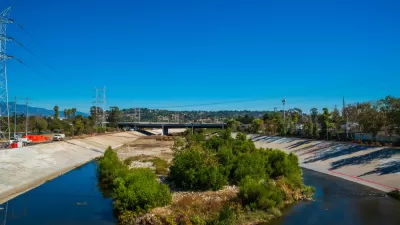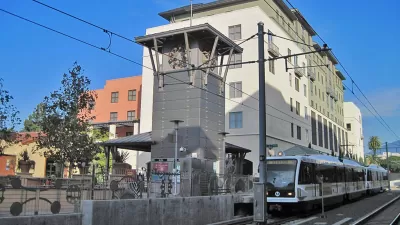Los Angeles Times op-ed writer Erin Aubry Kaplan shares her feelings upon seeing whites return to Inglewood, California half a century after they fled. One consistent theme emerges: "Whatever black people have can be taken away."

"Gentrification is big news all over L.A., and working-class and lower-income people across the county stand to lose a lot from its advance," writes Erin Aubry Kaplan. "They already have. But black people in particular will feel the sting."
Kaplan, an African-American woman has lived "in and around" the city of Inglewood for the last 13 years. In this column, she traces the history of the city, incorporated 1908 in the South Bay region of Los Angeles County, beginning with the first blacks who moved there during the 1960s, causing the resentment of many whites, resulting in white flight. The city of 111,000 is predominantly Latino and African American
Speaking for blacks, she writes:
In lieu of economic wealth, we lay down roots, we build social cohesion out of the vacuum created by white flight, avoidance and indifference. Our neighborhoods are our strength, our visibility.
Leimert Park [a neighborhood in the city of Los Angeles] — a flashpoint of gentrification now — put Afrocentric culture on the map, literally, and has long been a hub of black civic and political organization. Inglewood isn’t Leimert Park, but it’s a significantly black city and distinct simply for that reason/
The pattern of shrinking black space is hardly new, by the way: Over the years, immigration and Latino growth remade traditionally black areas like South Central and Compton and Inglewood too. But today’s white influx feels particularly ominous, like the worst of our bad history looping back on itself.
Kaplan ends by writing that she doesn't see the return of whites to Compton as a welcomed sign of integration but as a "warning" that gentrification is encroaching, and displacement not far behind.
Hat tip to Julie Bloom of New York Times/California Today.
FULL STORY: Op-Ed: Whites are moving back to Inglewood. There goes our neighborhood.

Alabama: Trump Terminates Settlements for Black Communities Harmed By Raw Sewage
Trump deemed the landmark civil rights agreement “illegal DEI and environmental justice policy.”

Planetizen Federal Action Tracker
A weekly monitor of how Trump’s orders and actions are impacting planners and planning in America.

How Atlanta Built 7,000 Housing Units in 3 Years
The city’s comprehensive, neighborhood-focused housing strategy focuses on identifying properties and land that can be repurposed for housing and encouraging development in underserved neighborhoods.

In Both Crashes and Crime, Public Transportation is Far Safer than Driving
Contrary to popular assumptions, public transportation has far lower crash and crime rates than automobile travel. For safer communities, improve and encourage transit travel.

Report: Zoning Reforms Should Complement Nashville’s Ambitious Transit Plan
Without reform, restrictive zoning codes will limit the impact of the city’s planned transit expansion and could exclude some of the residents who depend on transit the most.

Judge Orders Release of Frozen IRA, IIJA Funding
The decision is a victory for environmental groups who charged that freezing funds for critical infrastructure and disaster response programs caused “real and irreparable harm” to communities.
Urban Design for Planners 1: Software Tools
This six-course series explores essential urban design concepts using open source software and equips planners with the tools they need to participate fully in the urban design process.
Planning for Universal Design
Learn the tools for implementing Universal Design in planning regulations.
Caltrans
Smith Gee Studio
Institute for Housing and Urban Development Studies (IHS)
City of Grandview
Harvard GSD Executive Education
Toledo-Lucas County Plan Commissions
Salt Lake City
NYU Wagner Graduate School of Public Service





























